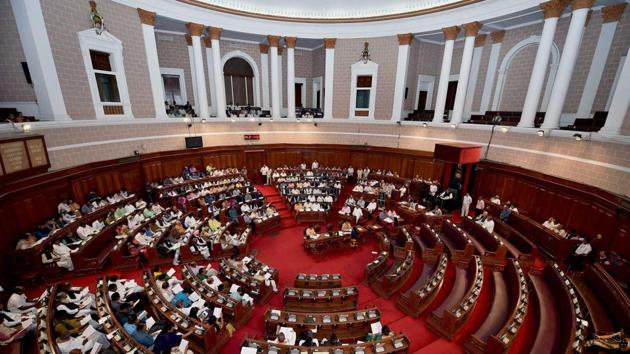Bengal assembly clears anti-lynching bill, death penalty part of provisions
The draft bill distributed in the Assembly earlier this week had life imprisonment as the maximum punishment. But the government on Friday tabled a revised version that carried the capital punishment. The Left and the Congress supported the Bill; however, the Bharatiya Janata Party (BJP) opposed it.
The West Bengal state assembly on Friday passed a bill that laid down the death penalty as the highest punishment for anyone involved in an act where the victim could be killed. The Prevention of Lynching Bill 2019 was passed by a voice vote.

The draft bill distributed in the Assembly earlier this week had life imprisonment as the maximum punishment. But the government on Friday tabled a revised version that carried the capital punishment. The Left and the Congress supported the Bill; however, the Bharatiya Janata Party (BJP) opposed it.
In a House of 294 members, BJP has 14 legislators, six of them won elections and eight switched over from other parties.
Earlier, Manipur and Rajasthan have brought in anti-lynching legislations.
Placing the bill in the house, chief minister Mamata Banerjee announced that her government is also contemplating compensation of up to ₹5 lakh for the victims and a job for the victim’s kin.
Manoj Tigga, leader of the BJP legislative team, said that they had opposed the Bill.
“We do not support mob lynching but we have a strong suspicion that the new legislation will be used against the opposition, particularly the BJP,” Tigga said.
Tigga pointed out that the Bill mentions that whoever takes part in a conspiracy to lynch another person or abets an act of lynching shall be “punished in the same manner as if he had himself committed lynching”, and claimed that this provision might be used against political opponents by the ruling party.
Communist Party of India (Marxist) legislator Sujan Chakraborty said, “We supported the Bill because it is against mob lynching. However, the Bill has loopholes and there is no provision for holding government officers concerned accountable if necessary. We wanted it to be sent to the select committee.”
The Bill defined lynching as “any act or series of acts of violence or aiding, abetting or attempting an act of violence, whether spontaneous or planned, by a mob on the grounds of religion, race, caste, sex, place of birth, language, dietary practices, sexual orientation, political affiliation, ethnicity or any other ground.”
It also stated that ‘mob’ means “a group of two or more individuals.”
The purpose of the legislation was “to provide for effective protection of the Constitutional rights off vulnerable persons and to prevent the lynching and to punish acts of lynching in the state.”
Explaining their opposition, Manoj Tigga said, “Our leaders, including the state unit president, are frequently coming under attack from TMC goons. Are these not cases of mob lynching? We suspect that the Bill has been brought to be used only when people belonging to a particular community come under attack.”
Three categories of punishment were proposed in the Bill. If an act leads to the victim “suffering hurt”, the perpetrator could be sent to jail for a maximum of three years and slapped a fine of ₹1 lakh.
If the victim suffers “grievous hurt”, the punishment may extend up to life in jail and a fine between ₹25,000 and ₹3 lakh.
In case of death of the victim, the convict may face capital punishment, or rigorous imprisonment for life and a fine between ₹1 lakh and ₹5 lakh.
The Bill also states that no police officer below the rank of an inspector of police shall investigate any offence committed under this act.
While there have been several incidents in the state over the past few years, the subject of lynching has also ignited a war of words between the leaders of the Bharatiya Janata Party and the ruling Trinamool Congress.
According to the proposed legislation, the state would have a state coordinator not below the rank of an inspector general of police, who would be chosen by the director-general of state police. He would be called the nodal officer and would “monitor and coordinate prevention of lynching.
In the case of Kolkata, the commissioner of police would appoint the nodal officer who would not be below the rank of an additional commissioner of police.
According to the Bill, the nodal officers would hold meetings at least once a month with the local intelligence units of the districts and police commissioners to “identify the existence of the tendencies of vigilantism, mob violence or lynching in the area”.
The nodal officers would also take steps to stop the dissemination of offensive material through different social media platforms or any other means.






